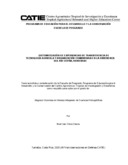Sistematización de experiencias de transferencia de tecnología agrícola y organización comunitaria en la subcuenca del río Copán, Honduras
info:eu-repo/semantics/masterThesis
| dc.contributor.author | Chica Claros, N.I. | |
| dc.date.accessioned | 2014-10-18T03:31:33Z | |
| dc.date.available | 2014-10-18T03:31:33Z | |
| dc.date.issued | 2005 | es_ES |
| dc.identifier | 367660 | es_ES |
| dc.identifier.uri | https://repositorio.catie.ac.cr/handle/11554/4161 | |
| dc.identifier.uri | http://orton.catie.ac.cr/repdoc/A0688e/A0688e.pdf | es_ES |
| dc.description | Tesis (Mag. Sc.) -- CATIE, 2005 | es_ES |
| dc.description.abstract | Este trabajo se planteó el objetivo de facilitar el análisis, reflexión, aprendizaje y retroalimentación, en tres casos de estudio: Proyecto Chaya, sistema de abastecimiento de agua de siete comunidades en Copán Ruinas y los componentes sistemas de Producción sostenible y desarrollo local y democratización, ejecutados por el Organismo Cristiano de Desarrollo Integral de Honduras (OCDIH). Los resultados expresan como los proyectos han sido influidos por la pobreza de la zona, la carencia de tierra y agua, por características de liderazgo, educación, desmotivación y valores de las personas. Algunos conflictos como la tenencia de la tierra, incremento de la pobreza, y pérdida de algunos valores han enmarcado las acciones, pero otros como la descentralización, procesos culturales y un ambiente de mayor respeto y acercamiento, han caracterizado estas experiencias. Por lo anterior se recomienda una gestión de cuencas hacia la resolución de conflictos de uso del suelo en algunas áreas, por medio del diálogo y negociación, fortalecimiento local, participación ciudadana y desarrollo de valores. The objectives was to facilitate the analysis, reflection, learning, and feedback in three cases of study: Proyect Chaya, system of water supply for seven communities in Copán Ruins, and the components: sustainable production systeMON, and local development and democratization, executed by the Christian Agency of Integral Development of Honduras (OCDIH). The results show how the projects have been influenced by the poverty, the lack of land and water, and also by characteristics of leadership, education, lack of motivation and values of the people. On one hand, some processes of conflict by the possession of the land, increment of poverty, loss of some values had framed the actions. On the other hand, the decentralization, cultural processes and an environment of respect and approach, have characterize them. In this juncture, a watershed management in the resolution of conflicts on land use, through the dialogue and negotiation, local strengthening, civic participation and development of human values is suggested. | es_ES |
| dc.language.iso | es | es_ES |
| dc.publisher | CATIE, Turrialba (Costa Rica) | es_ES |
| dc.relation.ispartof | Maestría en Manejo y Gestión en Cuencas Hidrográficas | |
| dc.subject | HONDURAS | |
| dc.subject | TRANSFERENCIA DE TECNOLOGIA | |
| dc.subject | COMUNIDADES RURALES | |
| dc.subject | DESARROLLO DE LA COMUNIDAD | |
| dc.subject | PARTICIPACION SOCIAL | |
| dc.subject | SISTEMAS DE EXPLOTACION | |
| dc.subject | SOSTENIBILIDAD | |
| dc.subject | DESCENTRALIZACION | |
| dc.subject | POBREZA | |
| dc.subject | CUENCAS HIDROGRAFICAS | |
| dc.title | Sistematización de experiencias de transferencia de tecnología agrícola y organización comunitaria en la subcuenca del río Copán, Honduras | es_ES |
| dc.title | info:eu-repo/semantics/masterThesis | es_ES |
| dc.title.alternative | Systematization of experiences in agricultural technology transfer and communitarian organization in the subwatershed Copán, river, Honduras | es_ES |
| dc.type | Tesis de maestría | es_ES |
| dc.identifier.publication | Turrialba (Costa Rica) | es_ES |
Files in this item
This item appears in the following Collection(s)
-
Tesis [2911]


